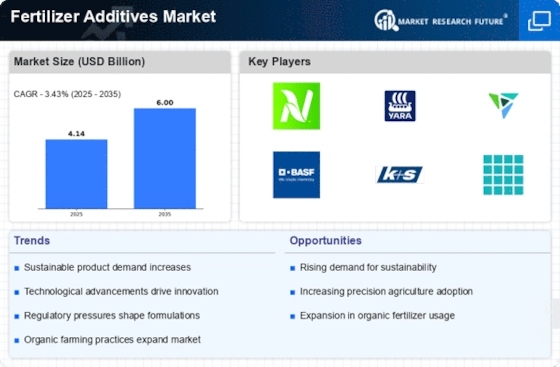Market Trends
Key Emerging Trends in the Fertilizer Additives Market
Fertilizer Additives Market is witnessing dynamic trends that are reshaping the landscape of agricultural practices globally. One prominent trend is the increasing demand for sustainable and environmentally friendly fertilizer solutions. As awareness of the environmental impact of traditional fertilizers grows, there is a rising preference for additives that promote eco-friendly and responsible farming practices. This includes the adoption of slow-release fertilizers, which not only enhance nutrient efficiency but also reduce the risk of nutrient runoff, minimizing the environmental footprint of agricultural activities.
In tandem with sustainability, precision agriculture is emerging as a key trend in the fertilizer additives market. Precision agriculture leverages technology, such as GPS guidance systems and sensors, to optimize the use of fertilizers and other inputs. This trend reflects a shift towards more efficient and targeted application methods, allowing farmers to tailor their fertilizer use based on specific soil and crop requirements. This not only improves the overall effectiveness of fertilizers but also contributes to resource conservation and cost efficiency.
The market is also witnessing a surge in the development and adoption of bio-based fertilizer additives. With an increasing focus on organic and natural farming practices, there is a growing demand for additives derived from biological sources. These additives often include beneficial microorganisms that enhance nutrient availability to plants and promote soil health. The trend towards bio-based solutions aligns with the broader movement towards sustainable agriculture and reduced reliance on synthetic chemicals.
In response to the changing climate and weather patterns, another notable trend is the development of climate-smart fertilizer additives. These additives aim to address the challenges posed by climate change, such as unpredictable rainfall and extreme temperatures, by providing nutrients to crops in a more resilient and adaptable manner. Climate-smart additives contribute to the overall resilience of agricultural systems, helping farmers mitigate the impacts of climate variability on crop yields.
Technological advancements continue to play a pivotal role in shaping market trends. The integration of data analytics and artificial intelligence into agriculture, commonly referred to as AgTech, is influencing how farmers approach fertilizer management. Smart farming technologies enable real-time monitoring of soil conditions and crop performance, allowing for data-driven decisions in fertilizer application. This trend not only enhances efficiency but also facilitates a more precise and optimized use of fertilizer additives.
Market trends in the fertilizer additives sector are further influenced by changing consumer preferences and government regulations. As consumers become more conscious of the environmental and health implications of food production, there is an increased demand for sustainably sourced and responsibly produced agricultural products. This shift in consumer preferences encourages the adoption of fertilizer additives that align with these values, driving market players to invest in sustainable and ethical practices.
Government regulations also play a crucial role in shaping market trends. Environmental regulations, in particular, impact the formulation and usage of fertilizer additives. Stringent guidelines to minimize nutrient runoff and soil pollution drive the development of additives that comply with these regulations. Additionally, incentives and subsidies provided by governments to encourage sustainable farming practices contribute to the adoption of eco-friendly fertilizer additives.
In conclusion, the fertilizer additives market is experiencing a transformation driven by various trends. From a growing emphasis on sustainability and precision agriculture to the rise of bio-based and climate-smart solutions, these trends reflect a broader shift towards more efficient, environmentally friendly, and technologically advanced agricultural practices. Market players who align their strategies with these evolving trends are poised to capitalize on emerging opportunities and contribute to the ongoing development of a more sustainable and resilient agriculture sector.


















Leave a Comment